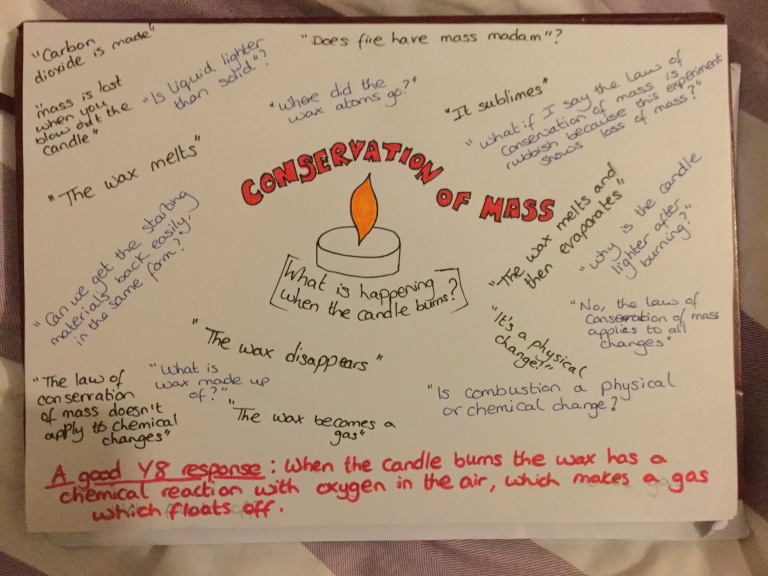Yesterday I had one of those amazing lessons where you feel you have made a huge amount of progress with a class. The class were Year 8 and it was Friday afternoon, not always a time of the best focus! It wasn’t a whizz bang lesson, there was no use of ICT (unless you count using their iPads as timers), there were no miniplenaries or exit tickets. There wasn’t a worksheet, just some sentences on the board. I didn’t leave the lesson feeling wrung out like a dishcloth, drained of all my mental and physical energy, although I think the boys may have certainly felt mentally challenged. So, in my eyes, why was it a “magical lesson”?
Putting the lesson in context, we have been focusing on the Law of Conservation of Mass, one of the big ideas of science. This will eventually lead us to balancing equations, something that it is essential the boys understand if they are going to be successful higher up the school. In preceding lessons we had looked at both physical changes (melting and dissolving) and chemical change (copper sulfate + sodium hydroxide) and found that mass is conserved within the limits of experimental error.
There were 2 tasks in this lesson.
- Burn a candle for 5 minutes and determine any change in mass
- Burn 2g of wooden splints until the fire naturally extinguishes itself and determine any change in mass
- For both these experiments, draw a suitable results table, state the change in mass and explain why it occurred.
So yes, Year 8 burning stuff on a Friday afternoon!
The simplicity of the task played a huge part in the success of the lesson. The experiment had to be simple enough for the students not to need me too much for the mundane, logistical aspects of the work like what to do next and where equipment was. It also needed to be not too cognitively demanding so simply completing the task wasn’t taking up too much of their cognitive load, leaving them enough brain capacity spare to think about what was happening. The boys also needed to not be overwhelmed with follow up tasks, so they didn’t feel rushed into just completing the work rather than thinking. Other important factors include the behaviour of the boys, the task was not without its hazards even if they were well assessed and controlled. They are also a group who I feel I have a great level of trust in me as their teacher, even though I often make their brains hurt!
The magic of this lesson was purely down to the questioning. Throughout the practical and write up period I was walking around the class asking questions, eliciting what the boys thought was happening, probing their understanding and guiding them with their use of language.
What came out of this was astounding. Despite the work that had preceded this, the boys had a number of alternative conceptions (I won’t call them misconceptions as that word has negative connotations). They had learned that mass is conserved as a fact, but faced with an experiment with an apparent loss of mass they struggled to reconcile this with the evidence in front of them. Some of their discussions with me and each other were also limited by immaturity in their language. They talked of mass “disappearing” alongside correct and incorrect use of scientific terms like melting and sublimation. Some were focused on the melting of the wax around the candle flame rather than what was happening in the flame. When faced with the question “is combustion a chemical or physical change?” they almost always said physical. This was rarely qualified with explanation, just a word plucked from the air or maybe simply said because it was the latter of the 2 options (apparently this is the way to trick 2 year olds into things you want them to say/do, given 2 options they will mostly choose the latter one).

The best statement I used in the lesson, during the plenary at the end was “so I am going to say to you that the Law of Conservation of Mass is rubbish because your experiment shows mass is lost, what do you think?” In the ensuing sea of hands volunteering answers, despite the probing questioning, I still had alternative conceptions given, even the statement “the Law of Conservation of mass doesn’t apply to chemical change” (remember in the previous lesson we had proven it did apply to the formation of copper hydroxide in solution). Thankfully other boys then intervened, confident now in their ideas following the discussion. We even got as far as “the was reacted and because carbon dioxide which is a gas and floated away taking its mass with it”.
So the human factor was the important one in this lesson. The trust between teacher and students being crucial. I can honestly say that all the boys made leaps in their understanding and their communication of ideas. I will attempt the same lesson with my other group of Year 8s and see if the outcome is similar. I will also revisit the ‘big idea’ with this group and see what has stuck (it will have been half-term after all!)